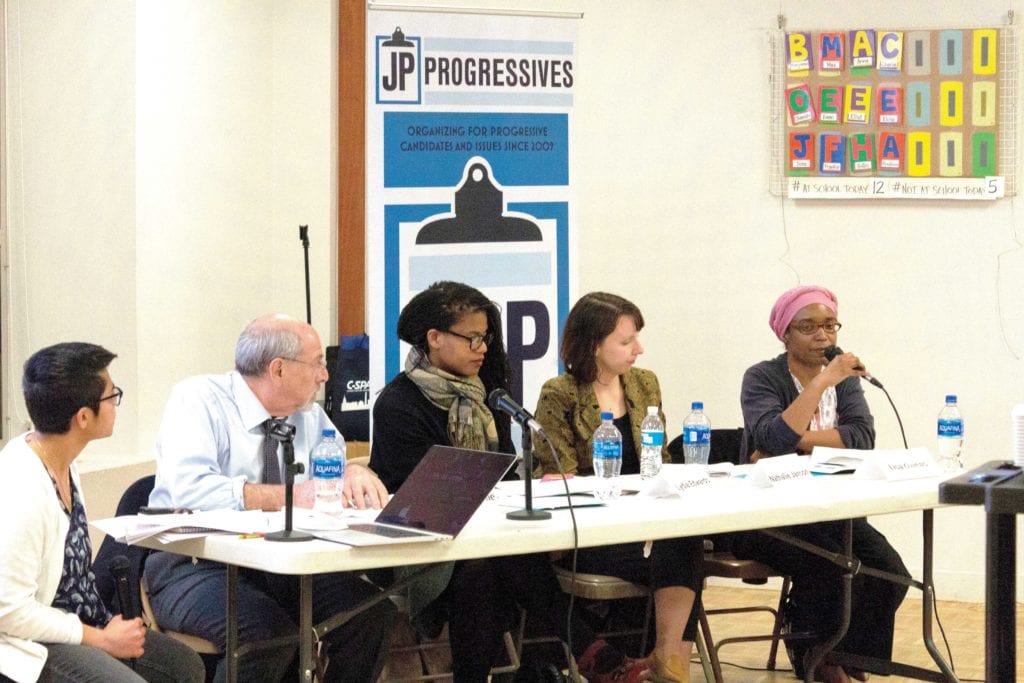
At a meeting held by JP Progressives Monday night, local advocates for fair housing discussed Boston’s housing crisis and what they can do to fix it.
While many solutions were discussed, including some that are already being proposed in the city government, most of the panel speakers at the April 29 event agreed that instead of building more market-rate housing, the city needs to create housing for its lowest-income residents.
“If the need is really at the bottom, we need to be flooding that market with as much affordable housing as we can, and as much rental assistance,” said Nathalie Janson, development associate at Preservation of Affordable Housing. “And then we can let it trickle up.”
City Councilor Lydia Edwards explained that the city’s housing market is segmented, and building more housing in one area of the city will not stop rising rents in another neighborhood, and creating studio housing will not help people living in family units.
“If you’re going to use market-based understanding of supply and demand, then you must supply more of one to get to be cheaper on the other end,” Edwards said. “We need to build more family housing that’s affordable in order to allow family housing to be more affordable. To say, ‘I’m building a bunch of luxury units downtown,’ and somehow that’s going to make families have more affordable units in East Boston, it’s not working.”
Edwards noted that the planned Suffolk Downs development in her district of East Boston could potentially create 10,000 units once it is completed, and said that that housing should reflect the incomes of the people who live around it right now, not potential high-income residents that don’t currently exist in that area.
Lisa Owens, executive director of City Life/Vida Urbana, noted that while 65 percent of Boston residents are renters, neighborhoods with lower incomes, which also tend to be the neighborhoods with more people of color, have much higher rates of renters versus homeowners.
“In order to not be housing cost-burdened in the Greater Boston region, you need to make $33.46 [per hour],” Owens said. “If you want to afford a two-bedroom apartment in the Greater Boston area, you have to make $69,600 [per year] — but 43 percent of the entire city makes $50,000 or less.”
Barry Bluestone, former director of the Dukakis Center for Urban and Regional Policy at Northeastern University, explained that part of the reason the city’s rents are so high is that Boston has been so successful in attracting students and young professionals, many of whom opt to live with roommates into their late 20s.
“Three or four people get together, they take over a triple-decker third floor, and they can pay three times the rent that a working family can,” Bluestone said.
Edwards spoke about two proposals she has made which potentially would help with the housing crisis: a transfer tax that would impose a 6 percent fee on certain property sales and raise money to be dedicated to affordable housing, and a zoning amendment that would write civil rights and fair housing practices into law that applies to all future developments.
Owens also explained that her organization wants to create a zoning amendment called an “anti-displacement zone,” which residents of an area could petition for in order to get special protections around just-cause evictions, jobs and transit access.
Edwards said that for the city to fix the housing crisis, it needs to focus on the residents that need the most help.
“The millionaires will be fine,” she said. “If you can plan for the single mother raising three kids in Boston … if you can plan for that person who just graduated from college and making $25,000 a year — if you can plan for that person, you’ve already planned for the person with more resources.”


![Banner [Virtual] Art Gallery](https://baystatebanner.com/wp-content/uploads/2024/04/Cagen-Luse_Men-at-store-e1713991226112-150x150.jpg)



